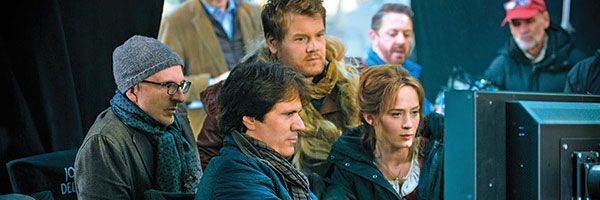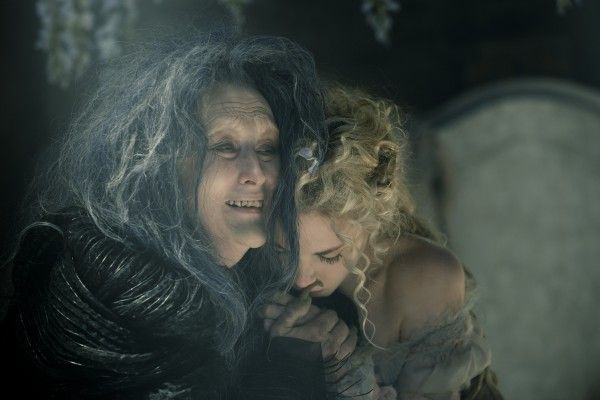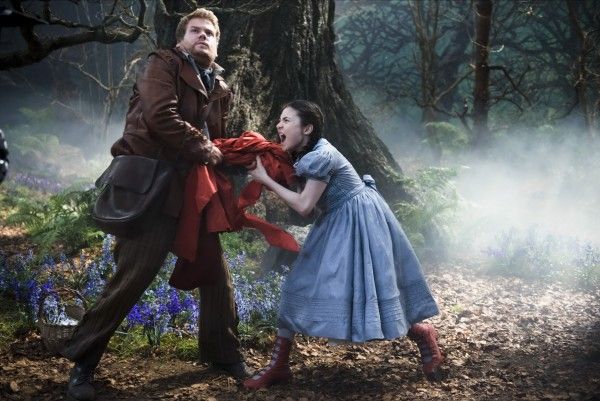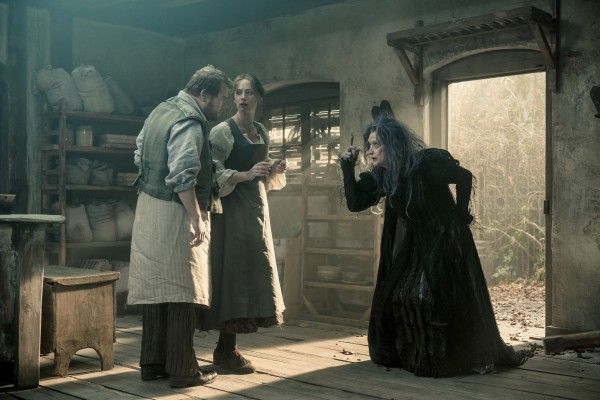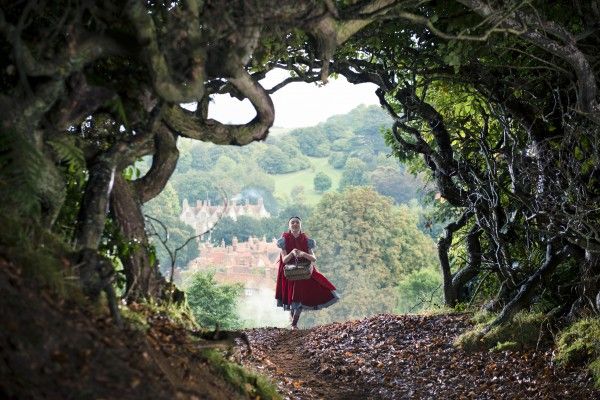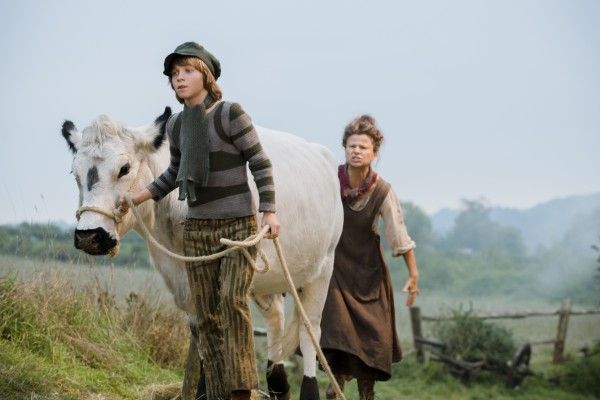There have been attempts to turn Into the Woods into a movie for decades, but it wasn’t until the 10th anniversary of the 9/11 attacks when President Obama told the victims’ families, “You are not alone … No one is alone,” that director Rob Marshall knew that it was the right time for the film to finally happen - and sure enough, it did.
With Into the Woods due for a Christmas Day debut, I got the opportunity to sit down with producers Marc Platt and John DeLuca to talk about the process of bringing the beloved Stephen Sondheim and James Lapine musical to screen. They discussed Marshall’s leadership qualities, the budget of the film, nailing the 16-minute opening and also offered updates on Ryan Gosling’s directorial debut, Lost River, Steven Spielberg’s untitled Cold War thriller and the Wicked movie as well. Catch it all after the jump.
Why now for this movie? I read in the notes that you thought it'd perfect for a post-9/11 audience and that something President Obama said sparked an interest in making it happen now, but is there any piece of the production that made you think, ‘This is it. Now we can really do it?’
MARC PLATT: This project was almost made many times in the last 28 years in Hollywood. Aside from the emotional reason that I think Rob and John came to, which is the 9/11 story, the understanding of a need for community in a time when no one is alone, I think that once Rob Marshall declared that he wanted to do it, you had to know, okay, you have the right director to do it, a director who actors love, who understands the medium of musicals and film musicals especially. And the actors came like magnets, both because of Rob and Steve Sondheim, because of the excitement over getting to perform his work. It all came together in a very organic way and it became undeniable. It became undeniable that this is the time, this is the movie and it's this version of the movie. It was undeniable certainly for me, and clearly it was undeniable for Disney that went ahead and made the movie.
JOHN DELUCA: Rob also has a deep connection the piece. He's a very family oriented person. He loves tradition. He loves children. He had great parents himself. And he just always understood - I’ve known him for 32 years - he’s always had a very strong connection between the parent/child relationship, and he is a great parent. And he's a parent to everyone, including us. He really listens to everyone. He's firm. He knows exactly what he wants, but stays open, so being strict but still giving you the freedom and the trust in yourself, from the actors, from the creative team, from us, wanting our opinions on everything as well. He makes you feel that you’re part of it, so just that instinctual perfect parent that he is, nurturer, is to me, the reason why the piece is very special.
I don't think people realize how important it is to have a director who’s somewhat of a parental figure when you’re practically living on set. That’s your life there for however many months you’re working on it.
PLATT: It's important emotionally to have a leader like that and a communicator. Good direction is often based on the ability to communicate.
DELUCA: Absolutely.
PLATT: And from a logistic, producorial, aesthetic point of view, a musical has so many different elements to it. There's so many ideas and themes and moving parts to it that need to be unified - the music, the orchestration, the lyrics, the script, the acting style, the design elements - and you need someone at the center who unifies it so everyone’s creating the same world and not doing their own world and you would get a piece that wouldn't add up. And Rob is particularly astute and accomplished at having a notion of what the tone and what the film should feel, and the texture of it and the tone of it, and then communicating that and bringing the team along in a unified way.
DELUCA: Very well said. And he always pushes all the creatives. He doesn’t want to stick us into a time or a period. He wants everyone to be creative and imaginative, but then keeping it, as Mark said, within this world.
I don't have any attachment to the source material, but when I heard the movie was finally happening, I went and watched the original Broadway performance. I did enjoy it, but I was also busy assessing its big screen potential and right off the bat with that opening, they had three sets on stage and it works because you can see all of them at once, but of course I’m wondering, how can you do that in a movie?
DELUCA: That specific moment you're speaking of where there are three different stories happening …
PLATT: 16-minute opening …
DELUCA: There's a 16-minute opening. [Laughs]
I could not believe that played so well!
DELUCA: But, originally we scripted it as ...
PLATT: Triptych.
DELUCA: As three different panels on the screen and then there would be two, sometimes three every time that came in, and we were editing like that, and then we said, ‘Why don’t we just try it to see if we can keep the worlds alive if we let that triptych idea go?’ And then we did, and that's another thing about Rob staying open to that. And it worked better. And then we went back and Rob has to see everything, we went back and forth for a very long time, but then it told the story in a better way.
PLATT: It didn’t work on film. You didn't know where to look or where to listen on film. Somehow on stage you're getting a different picture, but it didn’t work on film and by sort of splitting it up and letting Rob decide, ‘Okay, I want to be front and center on Cinderella at this moment, even if someone else is singing with her, and now this is Jack's story right here,’ and it really worked in such a seamless, accomplished and exhilarating kind of way. It's an extraordinary opening to a movie.
DELUCA: Rob is exceptionally musical as well. He just really has a wonderful, wonderful ear. He hears all the intricacies of Sondheim's very tricky melodies and [he’s] very good with language, so also helpful in James as they worked on the script together. It was a beautiful relationship.
How much of this was shot on a stage?
PLATT: It's hard to know the percentage. Maybe 60% on the stage and 40% on location. It was a real mix. We wanted it to feel real because the character, the emotional reality of these characters needed to be real because the trees in England have their own stories to them and it was important that every tree and every part of the woods have a personality because there were castles that we could use and waterfalls. We wanted it to feel real.
We also had budget constraints, which didn’t establish the aesthetic but went hand-in-hand with the aesthetic because we just couldn’t spend lots and lots of money. And then there was the challenge of creating the woods that was on the set. The hope was that when you watched the film you would never know the difference between what was outside and what was on the set. It's an extraordinary accomplishment because of our designers, because of Dennis Gassner and Dion Beebe.
DELUCA: And Rob never giving up, I must say, because I was there every minute and we would walk in to the set, ‘No, it's not right.’ Really, that was our biggest challenge to get those woods to marry with our locations. That again was a great collaboration between those people, our cinematographer, our production designer and Rob, just to work it so that it was our woods, too.
I don't want to just flat out ask about your budget, but I read a couple of articles online that said $40 or $50 million and I'm curious, because, to be honest, when I watched the movie last night, this does not look like a $40 or $50 million dollar movie.
PLATT: It's a sumptuous, gorgeous movie. You're exactly in the range, that's exactly correct.
DELUCA: You are, and that's a great compliment. Thank you.
PLATT: It's a compliment to how the film was made, and one of the ways we got there was also because those involved, starting with our director, everyone on the cast took significant cuts to make the movie because they wanted the joy and the experience of working with Rob and of being able to inhabit the characters created by James Lapine and Stephen Sondheim. And every day, we're getting paid no money, people would come to set and the feeling would be, ‘I can't believe how lucky we are,’ everybody, that we get to do this today, and we get to actually perform and create a film version of Into the Woods. So that's how the movie got made so economically.
DELUCA: And we're also very respectful of the budget. We don't take it lightly when we're given money to create something, though it wasn’t ever enough money, it never is. We got together, me, Mark and Rob and said, ‘This is what it is and if we want to make this movie we’ve got to be extra creative in keeping the budgets down and really being extra respectful of this budget.’
PLATT: And clever.
DELUCA: And clever. We said, ‘Okay, we're gonna be more creative because we have these limitations.’ And we embraced it.
PLATT: We made it a strength, not a weakness.
DELUCA: It was a nice thing we had each other to do that.
Before we wrap up, I'd like to ask you about a couple of other projects. What’s going on with Ryan Gosling's movie? Is it really going to another distributor at this point?
PLATT: No, it's being distributed by Warner Brothers and coming out in April.
And how about the untitled Cold War spy thriller? When am I going to be able to stop typing that and get the real title?
PLATT: The title of the film is coming shortly. That’s the Steven Spielberg, Tom Hanks film which we're about a week and a half away from completing photography on.
And lastly, I know this is somewhat old news because I don't think I’ve heard anything about it in a while, but I'm a big Wicked fan so must ask, what’s up with the movie?
PLATT: [Laughs] The development process of the Wicked film has begun, but it will take its time. When it's ready and I feel like everything is great, then the movie will proceed.
Do you think having completed this so successfully might help push that one along at all?
PLATT: That doesn’t need help pushing along. If it was up to the studio it would have been made 10 years ago.

